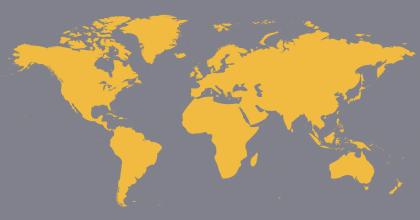
25 years working for the good of the Internet
This blog post was written by Netnod’s former CEO, LM Jogbäck, as part of a series of articles during Netnod’s 25th year in 2021.
The history of the Internet is the success story of an industry self-regulatory model where technical standards are developed by those who are most involved in the Internet’s day-to-day operations; and where policy development and Internet governance take place in an open and inclusive environment.
Although Netnod is a relatively small company, I am proud to say that we have played a big role in the success story the Internet has become, and in the success stories of our customers. As we celebrate our 25 year anniversary, I think this is a good moment to look at some of our most significant contributions.
1. Technical standards
The open technical standards developed in the Internet Engineering Task Force (IETF) are vital to the everyday functioning of the Internet. These standards, published as RFCs, cover many aspects of networking and describe the technical foundations of the Internet, such as addressing, routing, and transport technologies. In order to ensure a robust and well-functioning Internet, Netnod has played an important role in the development of technical standards.
Members of our staff have been chairs or co-chairs of various IETF working groups, and have had various leadership positions, like members of the IETF Administrative Oversight Committee (IAOC) or the Internet Architecture Board (IAB).
We have contributed to standards development with our staff authoring, and contributing to, many Internet Drafts and RFCs. The most recent of these was RFC 8915: Network Time Security for the Network Time Protocol. Working on the development of technical standards such as Network Time Security (NTS) is part of our commitment to ensuring that the Internet is as secure and robust as possible for everyone.
2. Policy work
The Internet depends on clearly defined, well structured policies for its continued operation and to meet new challenges as they emerge. As a result, Netnod has played an active role in policy work at both international and national levels.
Since 2000, Netnod has operated i.root-servers.net, the first root server to be deployed outside the US. The 13 root name servers are the top level of the Domain Name System and a crucial part of the Internet. Through our extensive DNS expertise, and our role as a root server operator, we are members of ICANN policy-related groups such as the Root Server System Advisory Committee (RSSAC) and the Security and Stability Advisory Committee (SSAC). The current chair position of ICANN's Customer Standing Committee (CSC) is held by a Netnod employee. Our staff also regularly participate in various cross-community working groups of ICANN.
Netnod is a member of the Internet Technical Advisory Committee (ITAC) which supports the Organisation for Economic Co-operation and Development (OECD). As part of ITAC, we work to ensure that the counsel and expertise of technically focused organisations support policy formulation for the Internet economy.
We constantly respond to consultation requests from the Swedish Government, the Swedish Post and Telecom Authority (PTS) and others. In this role, as can be seen in our detailed responses to regulatory proposals like NIS-2, we provide expert input on policy that impacts Internet operations and our customers.
3. Internet governance
As the Internet has become more central to society and the global economy, there has been an increasing need to develop a multistakeholder approach where every party with an interest in the Internet’s development can be involved and represented. Netnod has played an important role here to ensure our customers and the technical community are well represented at the highest levels.
World Summit on the Information Society (2003-2005)
The World Summit on the Information Society (WSIS) was a pivotal time for the history of the Internet. There was much debate at the time about the correct governance model for the Internet. As the main participants in the WSIS were governments and governmental organisations, it was difficult for the technical community to be directly involved in a process that had crucial implications for the future of the Internet.
Netnod participated in the WSIS as one of the Root Server Operators and made important contributions to defending the bottom-up, industry self-regulatory Internet model. An outcome of the WSIS process was the Internet Governance Forum (IGF) which has focused on a multistakeholder approach to Internet governance. The IGF has been held annually since 2006 with our staff playing an important role in its creation and being appointed to key advisory groups such as the Multistakeholder Advisory Group (MAG).
IANA Transition (2014-2016)
A very important process related to Internet governance took place when the contract between ICANN and the US Government for the Internet Assigned Numbers Authority (IANA) function expired. The IANA function provides the technical coordination of some of the key elements of the Internet’s infrastructure. This includes the global coordination of the DNS Root, IP addressing and other Internet protocol resources. With the contract between the US government and ICANN expiring, the important question arose: who would be responsible for IANA oversight?
The answer was what was called the IANA Stewardship Transition. Netnod was an essential participant here with three of our staff members appointed to the IANA Stewardship Transition Coordination Group (ICG) by the technical community. Together with our colleagues on the ICG, Netnod worked to ensure that oversight for the work of IANA became the responsibility of the global multistakeholder communities that rely on IANA’s services. The continued functioning of the Internet as we know it depended on the success of this work and Netnod contributed greatly to this success.
United Nations: International Telecommunication Union
Netnod has played an active role in the ITU-T Plenipotentiary. Held every four years, this is the highest policy-making body of the ITU, and is where Member States decide on the future role, focus and activities of the International Telecommunication Union (ITU). With a range of policy discussions and resolutions on a variety of subjects, some of the most important decisions taking place at the Plenipotentiary are related to matters of Internet governance.
4. Moving forward
Today it is clear that robust technical infrastructure is important not only to the Internet but also to society as a whole. The time and frequency services provided by operators like Netnod are crucial to the energy, finance and telecommunications sectors amongst many others while the leading role we are playing in Network Time Security enables much needed cybersecurity for everyone. We have seen over the last few years how vitally important it is for society that people can stay connected through Internet services that are fast, robust and scalable. I am proud of Netnod’s role here as the leading Interconnection provider in the Nordics and as the operator of a global DNS platform and one of the world’s 13 root name servers.
As we conclude this series of blog posts celebrating Netnod’s 25 years at the core of the Internet, I would like to look forward. As we look to the future, we will continue our work across the areas of technical standards, policy and Internet governance. We will focus not only on helping to improve the Internet architecture but also on helping organisations across society to use this architecture in the best possible way.
In the coming months, we will focus on how businesses and end users can be sure that web services are robust and reliable. We will also continue work on regional autonomy to ensure that the Internet throughout Sweden is more robust, decentralised and able to function effectively in all situations. On a more international level, we will evolve our DNS infrastructure to ensure a modern, scalable platform making it easier to expand our 70+ global footprint of sites and add more services and features for customers.
As ever, we are committed to ensuring secure, robust and well-functioning infrastructure that supports Internet services and society as a whole.
More information
You can read more about Netnod’s work in the areas of technical standards, policy and Internet governance here.
To keep up to date with Netnod’s work in these areas, sign up to the Netnod newsletter.



